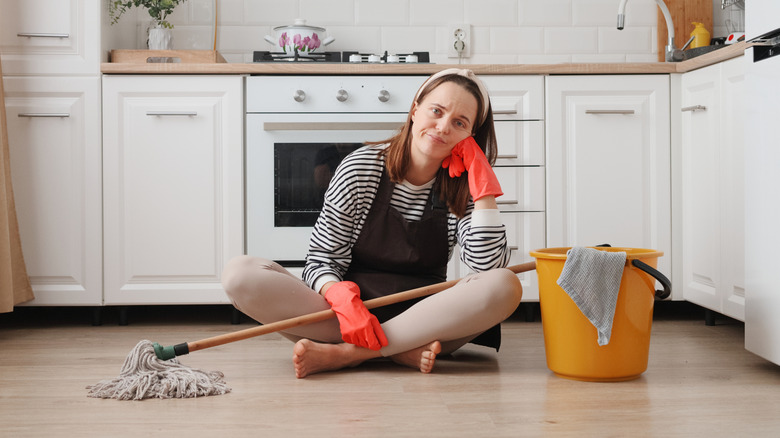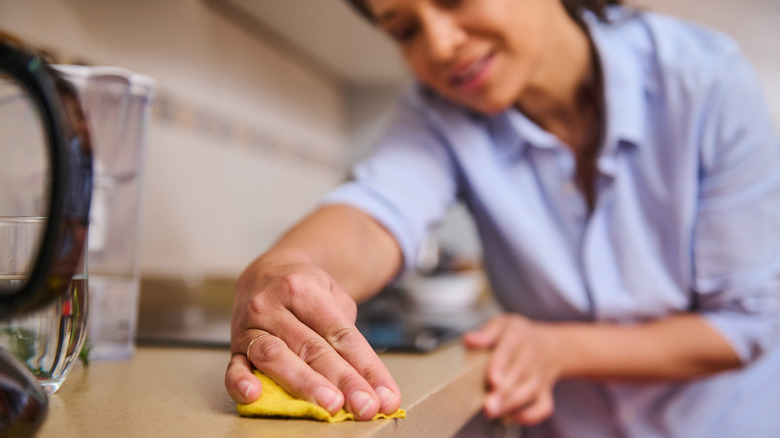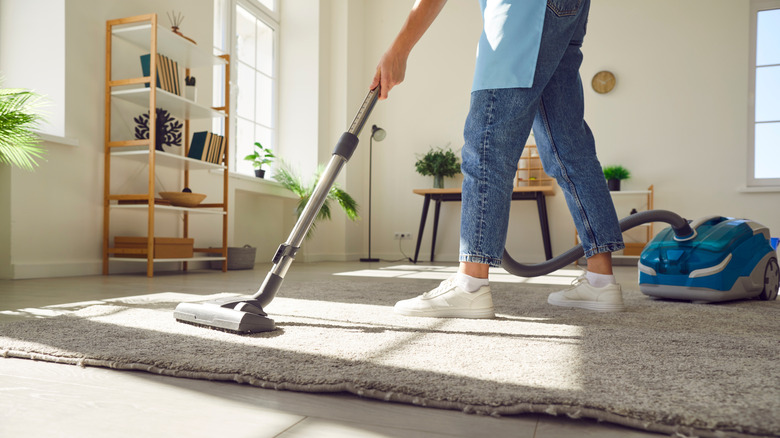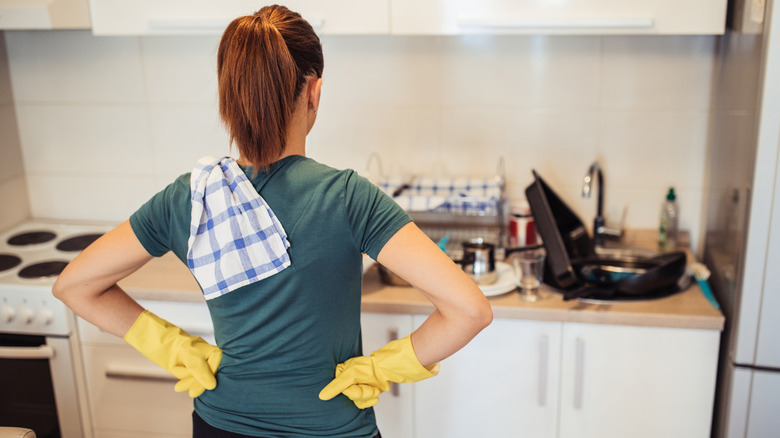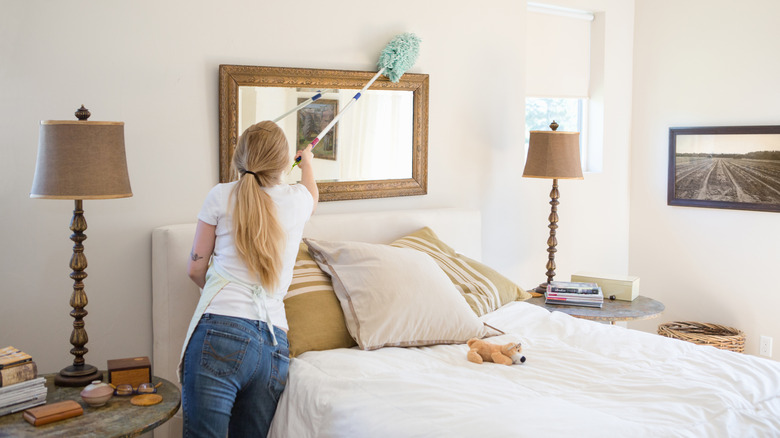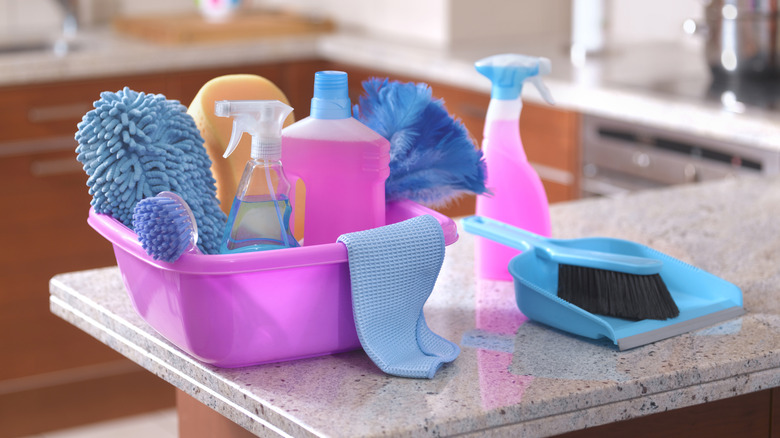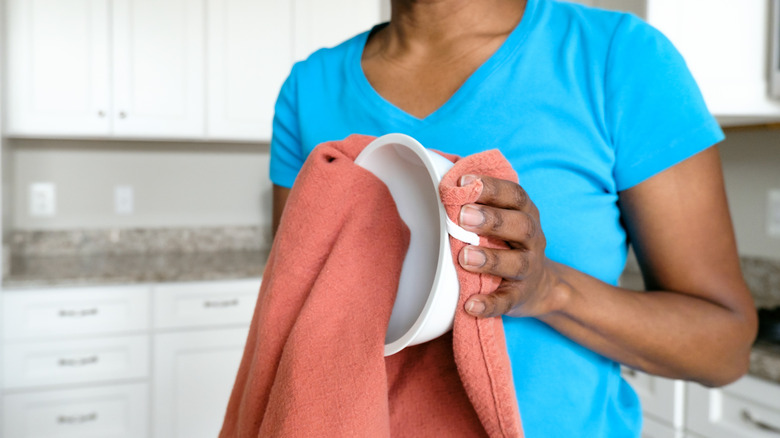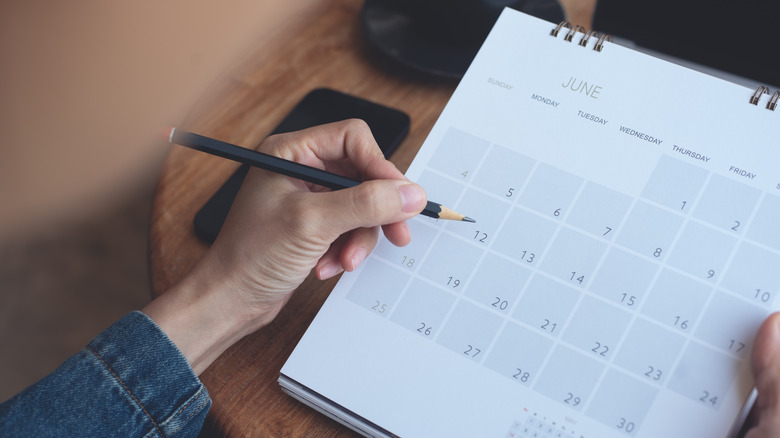15 Tips For Cleaning The House Even When You Have No Energy Left
We may receive a commission on purchases made from links.
It's been a long day at work. You came home to cook dinner for yourself (or your family), and now, you're tired and longing to put your feet up and relax in front of the television. However, your house is a mess. There are dishes piled in the sink, your counters are cluttered, and, let's not even talk about the state of the bathrooms. When you have no energy left, the prospect of trying to clean the house can be a daunting one. Finding the motivation to undertake even one more thing at the end of a long day, when all you want to do is relax and unwind, can feel nearly impossible.
We get it (we really do). Fortunately, you don't have to get stuck in a vicious cycle where your lack of energy leads to too many cleaning tasks being left unfinished and your home getting messier and messier. Even on days when you have no energy left, there are ways you can help yourself complete some necessary tasks and keep your home clean and tidy. Read on to find some tips that can help you overcome the energy slump that is holding you back.
Break larger cleaning projects into smaller and more manageable tasks
When you're already exhausted and thinking about all the cleaning tasks you need to complete, it can feel very overwhelming. To keep the pressure from mounting, segment each project into smaller and more manageable chunks. For example, if your kitchen needs a deep cleaning, you can think about all the different components that would be involved in completing that task, such as cleaning out the pantry, organizing the cabinets, cleaning the oven and microwave, mopping the floors, and cleaning the sink.
Once you have all the components mapped out, decide which order they should be completed. For example, you probably don't want to mop the floors before you clean the oven since you'll just end up throwing more crumbs on them. Now that you have your big goal segmented into smaller pieces, you can pick just one or two of those tasks to complete at a time. Being able to focus on the specific task you're working on can keep you from feeling overwhelmed by all the other things you need to do. You may also want to consider creating a schedule to keep yourself accountable and allow you to move on to the next project within a reasonable amount of time.
Set a goal to clean for just 20 minutes at a time
The prospect of cleaning for hours at a time can be daunting. If we get started, many of us only last for an hour or so before we're physically exhausted. We stop, telling ourselves that we'll pick the task back up later, but often this doesn't happen. Giving yourself more frequent breaks can help prevent exhaustion from standing in the way of completing a task. Try setting a timer to clean for 20 minutes. Once the timer goes off, give yourself a 10- to 15-minute break to recharge.
However, if you feel like you don't have it in you to do multiple 20-minute blocks, just end it there. Tidying for a little less than half an hour will get more done than not cleaning anything at all, so it's progress. Consider coupling this tip with the one above, tackling a small chunk of a larger task. When you have no energy, this approach can feel much less daunting than staring down the barrel of a multi-hour cleaning session.
Keep a running checklist to prevent feeling overwhelmed
Making a list of all the cleaning tasks you need to complete can be very helpful. Sit yourself down and write out a master checklist of everything that's been on your mental list and weighing on your mind. One reason to make a cleaning checklist is that it will help you avoid inadvertently overlooking a specific task. Once that job is written on your checklist, it will stay there as a reminder of what you need to do until you complete it and cross it off.
Checklists can be particularly helpful when you don't have a lot of energy. You can choose a task that matches your current energy level. So, if you're really exhausted one night, you might decide that cleaning all the toilets will be more manageable and less time-consuming than mopping all of the floors in the house. We also mustn't overlook how motivating it can be to see your to-do list start to shrink. With some motivation to continue checking things off the list, you might just find that extra burst of energy you've been searching for.
Prioritize your energy for the areas that will have the greatest impact
Being realistic about what you'll be able to accomplish is important. When you have limited time and energy, prioritize cleaning tasks that will have the greatest impact on the cleanliness or functionality of your home. First on this list should be anything that is related to the overall health of those in the house — so wiping down food prep areas, bathrooms, doorknobs, and other high-touch surfaces. Cleaning these areas will help prevent the spread of germs and bacteria that could make someone sick.
After focusing on the health and safety of others, consider which tasks will also have a significant visual impact. For example, if you want to have friends over, decluttering your entryway or living room to ensure you have space to enjoy one another's company may be towards the top of your list. If you have dogs or cats who shed and you need to get rid of pet hair in your home, then you might decide that vacuuming, mopping, or washing the slipcovers on your sofa will have the greatest impact.
Find something to distract yourself as you clean
Have you ever listened to music or chatted with a friend, then looked at the clock and wondered how so much time had passed in what seemed like such a short period? When you're distracted by something that you enjoy, time flies. So, if you can find something that will distract you while you are cleaning, it can help the task seem quicker and easier, powering you through your low-energy slump.
Before you pick up your cleaning tools, pop in your earbuds or connect to your Bluetooth speaker. Listen to your favorite playlist or podcast and get to work. Add even more fun to the chore by dancing or moving more as you work. The added movement can help give you an energy boost to keep you cleaning even more than you might have originally intended. If you have a friend that you can talk to for hours at a time, consider calling them up and chatting (via wireless earbuds) as you work through your cleaning list.
Choose a task you can complete when sitting down
When you have limited mobility or have already been on your feet all day at work, the prospect of standing up to fold laundry, load the dishwasher, or clean the counters can feel all the more impossible. To overcome this potential roadblock, choose a task or two that you can remain seated to complete. This way, you'll be off of your feet, but still able to knock a few things off of your to-do list so it doesn't become overwhelming in the near future.
Fortunately, many tasks can be done while sitting. You could sort through the pile of mail on your desk or kitchen island, fold laundry, wipe down and organize the drawers in your kitchen or bedroom, or even clean out the bottom of your closet.
Keep the momentum going by completing the same type of task across different rooms
There are a few reasons to consider completing the same type of cleaning task across different rooms instead of focusing on only one room at a time and switching from one task to the next (i.e., dusting, then wiping down the walls, then vacuuming or mopping the floors). If you pick one type of task — such as dusting — and complete it in each room, you can increase your cleaning efficiency. Instead of gathering up all the dusting supplies and then all the supplies you'll need for the various other jobs you want to complete, you can power through all the rooms without the need to stop and find other tools.
Beyond simply being more efficient, this approach to cleaning can also be particularly beneficial for those with low energy. It can seem less overwhelming since you are only doing one thing at a time. Plus, you won't have to think about all the other tools you'll need to get/carry back up and down the stairs like you would when switching between tasks. You'll also be able to more easily gauge just how much work is left before you're finished. With the dusting example, you can count how many surfaces are in each room and count backward as you check each one off of your list.
Enlist help from family members
If you don't live alone, you shouldn't be cleaning alone. You aren't the only one who made a mess, so ask the other members of your household to help you clean it up. When more people help, the workload becomes more manageable for all parties.
Depending on their age, children can also help by wiping down the baseboards, emptying the dishwasher, cleaning the counters, or folding laundry. You might decide that creating a cleaning schedule where everyone has the same tasks each week or a rotating schedule is best for your household. To make things more fun, assign points for different cleaning tasks (either completed individually or based on what the family gets done together) and come up with little rewards — such as a family game or movie night — once a certain number of points are earned.
Make sure you have cleaning products that will ensure efficiency and effectiveness
If you want to clean the toilet but don't have a toilet brush, you aren't going to be efficient or effective. Similarly, if you don't have the right type of scrub brush, you aren't going to be able to get all of that grime unstuck from your oven. Before cleaning, it is essential to make sure you have a fully stocked arsenal that will allow you to be productive and ensure your efforts are effective.
After making a list of all the cleaning tasks you need to complete, make a list of all the tools and cleaning products that you'll need to accomplish them. For example, you should have several microfiber cleaning cloths (such as these from AIDEA) on hand for wiping the kitchen and bathroom counters, long-reach dusting wands (like the OXO Good Grips Microfiber Extendable Duster) at the ready to help you clean your ceiling fans and overhead light fixtures, and a disinfecting spray (such as the Lysol All Purpose Cleaner) to remove germs and bacteria from surfaces.
Try following a clean-as-you-go approach
Cleaning as you go can help prevent your to-do list from getting overwhelming. While it may feel tempting to leave those dirty dishes in the sink until tomorrow, when tomorrow comes you aren't going to magically want to do them then, either. Plus, there will be more dirty dishes and other high-needs tasks that need to get done. The more all of these tasks start building up, the more overwhelming and impossible everything will feel.
So, instead of letting everything build and pile up (literally), try to clean as you go. Adopting easy cleaning habits will prevent your house from getting overly dirty and cluttered, and you will have smaller tasks to do at a time. This will ensure things stay manageable, even when your energy levels are low. Try to follow the mindset of putting something away instead of dropping it on the counter or another surface. Rinse off your dishes as you use them and put them in the dishwasher instead of leaving them in the sink, hang your coat or hat up instead of tossing them on a chair, fold each load of laundry as it finishes instead of letting the baskets pile up in the hallway or laundry room, and put away unused items immediately.
Create a manageable schedule — and stick to it
When too many tasks are left undone, it can make the prospect of cleaning your house feel all the more daunting — a sink full of dishes, loads of laundry piling up in the hall, dirty bathrooms, floors that need to be vacuumed and mopped. Preventing all of these tasks from accumulating can help you feel under control and prevent overwhelm from setting in.
Creating an effective cleaning schedule is one of the best ways to accomplish this goal. Start by making a list of all the regular household chores that you'd like to have completed every week (or even every other week). Once you have this master list, pull out a calendar, and assign tasks to different days. For example, maybe you'll clean bathrooms every Monday and vacuum the floors every Tuesday. Keep your other commitments in mind to help you decide which tasks you'll complete each day. If Wednesdays are your late night at work, choose a simpler and less involved task for that night. Seeing everything on a schedule can help you overcome that low-energy slump because you'll know precisely what you need to complete. Plus, it can motivate you to stay on schedule so you don't end up with double the load the following day.
Try out cleaning apps to gamify chores
One way to make cleaning feel like less of a chore is to download a cleaning app to gamify the process. There are several cleaning, organizing, and decluttering apps available to help you do just that. While each app offers a different format, they share a similar benefit: making cleaning more appealing with features such as built-in timers, schedules, tracking when tasks were last completed, or even earning points.
One app to consider is Tody. It is available for both iOS and Android devices and is designed to be easy to use. Once you create your account, the app automatically puts together a to-do list for you, prioritizing which tasks deserve your more immediate attention. The app will facilitate a race between you and "Dusty," as it learns your cleaning style and your specific needs to help you complete necessary tasks.
One other app you might consider is Sweepy. Also available for both iOS and Android smart devices, this app can help put together a daily cleaning schedule based on how much time you'll have available each day. You can share the app with other members of your family and compete with one another to earn the highest spot on the leaderboard. As an app manager, you can also award points to other family members to keep them motivated and excited to help clean — ultimately reducing your workload.
Aim for progress, not perfection
If you have it in your head that unless your home is immaculate, with nary a crumb, a speck of dust, or a stray hair, it isn't clean — it is easy to see why you may be lacking the motivation and energy to maintain your home. Aiming for such a high standard can feel impossible and may cause you to simply shut down. So, instead of aiming for perfection, set the goal to make progress towards completing necessary tasks.
Even if you only manage to clear five things off of your kitchen table, it will still be cleaner than it was before you started. Similarly, vacuuming the most used room in your home is better than vacuuming nothing at all. At a minimum, you'll slowly start moving towards a cleaner home. And, you never know — as you see the progress you're making, you might discover some new motivation to accomplish even more.
Make sure you're taking care of yourself to up your energy levels
We all feel exhausted every now and then. However, if you're constantly feeling run down and lacking the energy to take care of even the most basic cleaning tasks, the first thing you should probably focus on is yourself. Stress, poor sleep patterns and habits, diet, and more can all lead to fatigue and a general lack of energy. Examining your routine, lifestyle, and patterns can help you determine the underlying cause of your fatigue, helping you identify areas where some adjustments are necessary.
Some general self-care tips include getting at least 15 minutes of exercise each day (and gradually increasing the amount of time you work out each day until you are moving at least 2 ½ hours every day), eating small and healthy meals three or four times each day, decreasing your stress level, and developing a healthy sleep routine (sticking to a regular schedule and avoiding napping during the day). If your energy levels suddenly drops or you don't notice any improvement after implementing some changes to your routine, sleep schedule, or diet, reach out to your doctor. They can provide more tailored advice and determine whether there is a more serious concern.
If all else fails, turn to the professionals
Even if you make some changes to your routine and approach to cleaning, your schedule may not render it possible to get everything done. In these cases, you may want to consider hiring a professional cleaning service. Hiring someone to help doesn't mean that you are flawed; it simply means that you are being realistic and understanding your current needs.
If you do hire a qualified cleaner, it also doesn't mean that you need to turn everything over to them. Try to keep up with the daily tasks, such as doing dishes and keeping tables and other surfaces from accumulating too much clutter. With some extra help, you may also be able to get yourself back on track and eventually take things back over.
